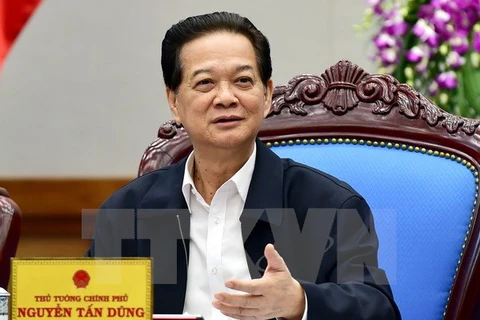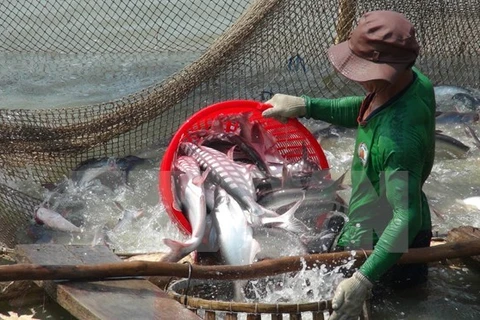Hanoi (VNA) – Hanoi authorities will strictly inspect large food processing plants, wholesale markets, supermarkets and shopping malls, besides small street vendors to prevent food poisoning during the Tet holiday and festivals.
The Hanoi People's Committee will uniformly implement all necessary measures to curb unhygienic food and food of unknown origins for the next three months, starting from December 19.
The inspections will focus on facilities producing, processing and trading products that are mainly used during the Tet holiday and festivals, such as meat and meat products, beverages, alcoholic drinks and confectionary.
The committee will organise six teams to inspect food safety and hygiene at large production plants and service facilities, whereas districts will establish inspection teams to check small facilities.
Tran Xuan Ha, Deputy Head of the Hanoi People's Committee's Popularisation and Education Committee, said the sanctions on those violating regulations on selling of unhygienic food must be upgraded to prevent any recurrence.
"Along with inspections and sanctions, all facilities that violate regulations and their locations must be made public to the media, especially those importing unhygienic food, expired food or food without stamps. Once every measure is implemented, the law breakers will stop their violations," Ha said.
The Hanoi Industry and Trade Department (ITD) said it would cooperate with people's committees at grassroots levels to organise training courses in localities for local food safety officials and boost awareness about food safety and hygiene.
However, food safety and hygiene in the capital is still a serious issue, with unsafe meat and vegetables being sold in wholesale markets, supermarkets, shopping malls and flea markets, Tin Tuc (News) reported. A majority of the consumers continues to buy cheap food without considering quality and the expiry date. Some are deeply concerned following media reports.
Therefore, ITD will co-operate with the Agricultural and Rural Development Department to establish a pilot project to manage facilities that produce hygienic vegetables and meat in Hanoi, in order to improve the situation and protect consumer rights and community health.
HCM City's efforts
Meanwhile, HCM City will intensify checks of food production and trading establishments from now through February 22 to safeguard public health during New Year and Tet (Lunar New Year), according to the Department of Agriculture and Rural Development.
Speaking at a meeting on December 16, Nguyen Thi Le Thoa, Head of the city's Plant Protection Department's food hygiene and safety management division, said inspectors would increase the number of pork and chicken samples they take to test for salbutamol, VAT Yellow, and Salmonella.
Establishments producing, processing or trading animal-based products found violating food hygiene and safety regulations would be severely punished.
The Plant Protection Department and other agencies would also keep a close on the use of plant protection drugs at vegetable growing areas.
They would obtain newly harvested vegetable samples from farmers as well as processing and packaging establishments and trading establishments (three wholesale markets, supermarkets and food shops) to check for residues of plant protection drugs.
The city Veterinary Department would collaborate with wholesale markets to test for chemical residues and banned antibiotics in seafood and seafood products, especially sugpo prawn, white-leg shrimp, saltwater and freshwater fish, cuttlefish, fish paste, and dried fish and shrimp.
HCM City would cooperate with seven other cities and provinces to inspect establishments supplying it food.-VNA
























